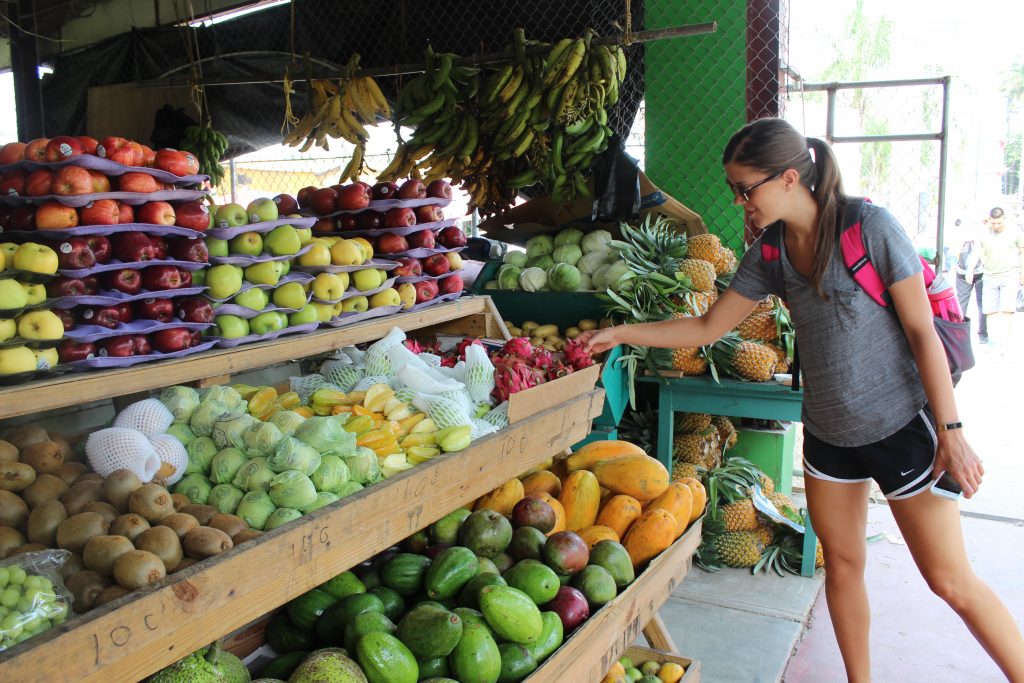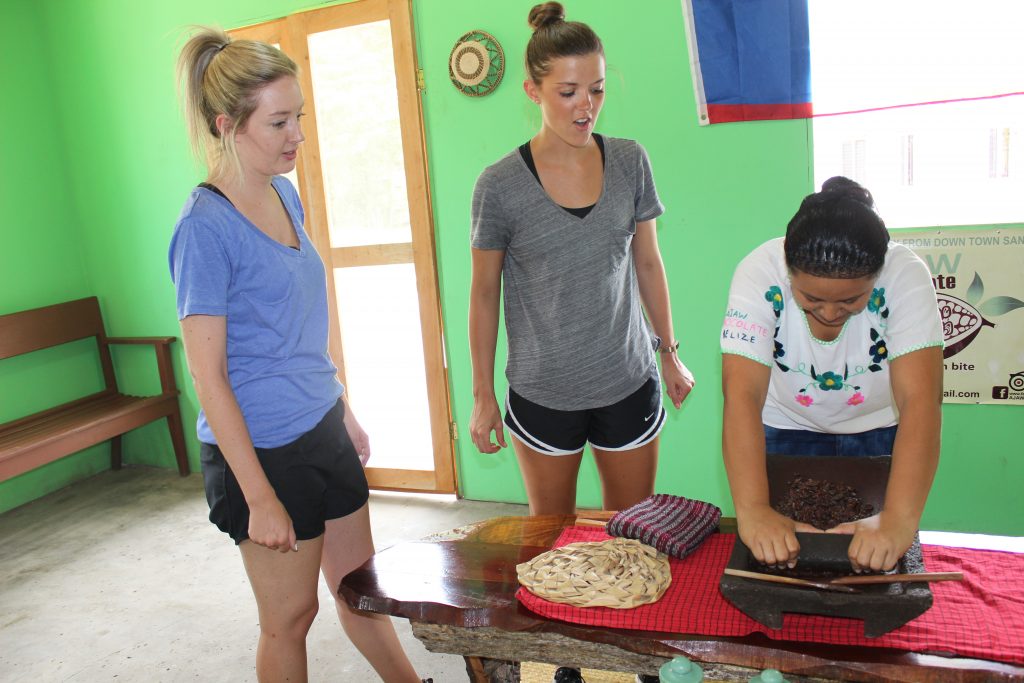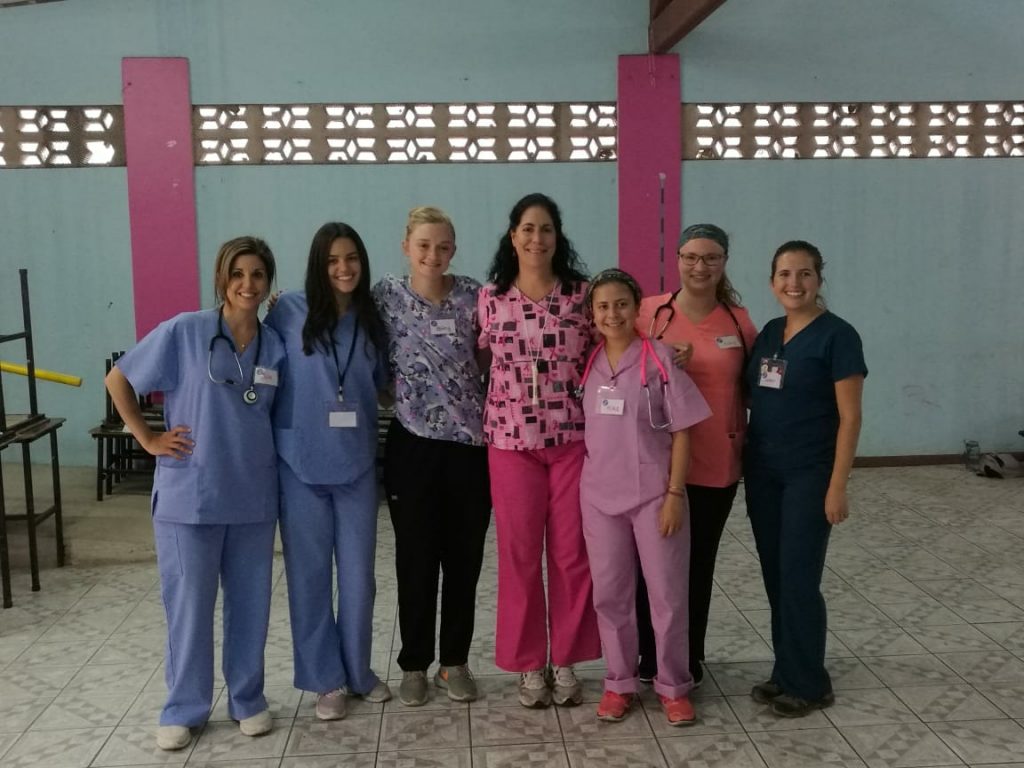Our goal is to allow those in our partner communities with little or no access to health systems to benefit from a nutritional assessment and treatment from a licensed nutritionist. Different institutions will also benefit from a food safety evaluation of their food services and an educational project aimed at residents or the population in charge. ISL aims to provide experiential learning opportunities and cultural expansion for entry-level nutrition students or health students interested in expanding their nutrition knowledge.
About Nutrition Programs
ISL’s nutrition programs focus on nutritional interventions in communities and in institutions with vulnerable populations and are designed with the premise of allowing entry-level nutrition and health students to learn and put into practice the knowledge of Clinical Nutrition, Community Nutrition, Food Safety, and Educational techniques.
Volunteers will have the opportunity to work directly with members of a community; carry out individual and group assessments; prescribe treatments and give recommendations; improve anthropometric evaluation techniques; develop skills for the execution of educational material; evaluate, improve, or plan a menu for institutions and provide recommendations regarding the institution’s improvement of food handling and food quality.
ISL’s program allows volunteers to learn about nutrition, interact with local licensed health professionals, and put into practice their knowledge in under-resourced communities, making them more humanistic professionals in the near future.
Who is Right for Nutrition Programs
ISL’s nutrition programs are ideal for entry-level nutrition students and health students who want to put into practice and expand their nutrition knowledge.

What to Expect
ISL staff will be waiting for you at the airport and take you to hotel/guesthouse where you be able to rest and settle. Next day, you will have an orientation in the morning with general information about the country, the nutrition program and food and safety concerns; in the afternoon you will have the professional orientation. The nutritionist will review the anthropometric and counseling techniques, vital signs, use and interpretation of growth charts with Latin American population, how to complete the medical chart, as well as logistics of each work day, vocabulary and more.
While working in the communities, first you will visit homes to get to know patient’s environment, lifestyle, also you will assess patients and complete a medical record that will include vital signs such as weight, height, head and arm circumference, skinfold measures, blood pressure, glucose test and hemoglobin test. These visits will be a great opportunity to relate patient’s diseases with their conditions and give a better treatment. The patient will get an appointment for the next day for the nutrition counseling and you will have time to prepare information and materials needed for the appointment. The materials given and counseling sessions will be supervised by a local licensed nutritionist and there could be a food donation for some patients that attended the session in some cases and/or refer them to a food sponsor.
You will also be working in institutions (CEN CINAI-Children Center and Nursing home), this experience will give you not only the opportunity to work with different age groups like elderly and children but also evaluate food safety procedures in the institution’s kitchen and dining room. After an assessment of patients and food safety, volunteers will have to determine the patient’s most common problems related to food and food handling issues. Based on what was found, volunteers will be presenting the results to the manager of the institution along with recommendations on how to ensure a balanced nutritional status of their residents and assure the production of innocuous food and also educate the patients, teachers, parents and cooks to improve their nutrition and quality life by talks, workshops and/or education material (for examples posters, information sheets, etc.).
Be aware: there will be virtually NO down-time during your ISL program. This is an immersive, intensive experience loaded with service activities and cultural exploration!
In the evenings, you will participate in workshops where you will learn about food preparation, recipe modification and blenderized food for home/institutional tube feeding patients. Also you will have the opportunity to participate in seminars of anthropometric measurements for athletes, talks about emotional and psychological aspects that relate to eating disorders and weight problems and the links the relation of environment and economic status with nutrition and different chronic diseases.
There will also be designated time for group reflection – time to discuss and express what you’ve experienced in your day’s community/institution work, either formally or informally.
You will eat most dinners out in order to relax and experience the local culture and cuisine. You will learn a few traditional dances and explore some important historical/cultural sites.
Recreational opportunities vary by location, but you will have opportunities like: shopping for local crafts and exploring geographic treasures such as beaches, volcanoes, rainforests or caves. Traverse ruins, tour city centers or trek through coffee plantations and have time for other exciting activities such as zip-lining, snorkeling or safari!
Volunteer Involvement
Volunteers will receive intensive training in taking anthropometric measures and vitals, evaluating food safety and developing educational material. Under the supervision of a local licensed nutritionist, volunteers will be allow observing and participating in taking vitals, diagnosis and treatment of community patients and evaluate institution’s food safety, give recommendations to the institution’s manager in order to improve food handling and food quality.
ISL collaborates with in-country professionals and local Ministries of Health in order to determine how our volunteers can best impact developing communities. Level of volunteer participation is directly dependent on level of training. For example, each program has the potential for three levels of volunteer involvement: observer, assistant, and practitioner. Health students volunteers would fall into the “observer” category in terms of the examination/diagnosis/treatment process, but would be allowed hands on experience with non-invasive procedures such as taking vitals, as determined by local Ministry of Health standards, while a nutrition student might assist in the examination, diagnosis, and treatment process to the degree determined appropriate by local Ministry of Health standards.

Safety and Respect
Respect of Our Patients
Patient consent is an essential pre-requisite for any level of volunteer participation. All patients sign a consent form to be seen by a doctor with students observing – we have their complicit consent to treat prior to their intake and examination.
Our patients are protected from exploitation – we are discreet and respectful. We do NOT under any circumstances take photo of any procedure during a patient’s visit. Furthermore, patient rights must be respected at all times; Patients have the right to refuse treatment.
ISL prohibits discrimination on the basis of color, national origin, disability, sex, gender identity, religion or any other factor.
Volunteer Safety
For the sake of security, ISL volunteers remain with other volunteers and ISL staff members at all times.
The safety of our volunteers is our number one priority. ISL has offices in all of the countries that we serve. That means wherever you go, rest assured, we’re there too. All ISL regional staff members are thoroughly screened to ensure the safety of your local interactions and we continuously monitor and address all emerging health and safety issues in each of the countries we operate.
Specific Precautions Taken by ISL
- ISL volunteers avoid large, crowded areas like sporting events whenever possible.
- We continuously monitor local media and information sources in each of our countries through our on-site staff, and take appropriate actions to avoid areas of concern.
- Our on-site staff provide feedback on the local situation in each community we work, and if recommendations are made to change itineraries or programming, we do so immediately.
- Our management team relies on the advice of a number of organizations including the U.S. State Department, the World Health Organization and Centers for Disease Control, the Federal Aviation Administration, the National Transportation Safety Board, as well as an international safety and security organization. If conditions exist that may hinder our ability to provide a safe program, we will alter the itinerary and redirect the program to safer regions or provide other alternatives.

What To Bring
You will need:
- Stethoscope
- Blood pressure cuff
- Otoscope
- Measuring tape
- Skinfold caliper
- Measuring cups (stainless steel)
- Measuring spoons (stainless steel)
- Scrubs
- Donations of medications
- Medical supplies (optional)
- Refillable water bottle (i.e. Nalgene bottle)
- Funds sufficient to cover one meal per day, recreation, incidentals, souvenirs and
departure tax (where applicable) - An open mind
- A sense of adventure
- A heart of service
What ISL Provides:
- 24-hour accompaniment by professional, bilingual staff
- Airport pickup/drop off
- All ground transportation
- All lodging
- Two meals per day
- Drinking water
- Instruction by licensed medical professionals
- Medications and supplies
- Anthropometric equipment (Body weight digital scale and stadiometer)
- Food scale and kitchen tools
- Quality experiential learning
- A meaningful glimpse into another culture
- An unforgettable adventure
